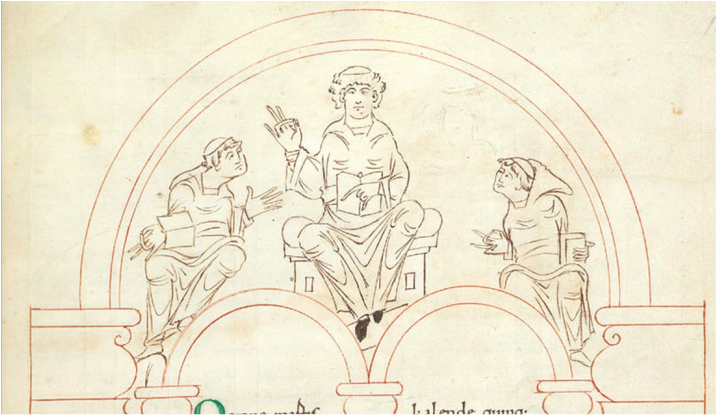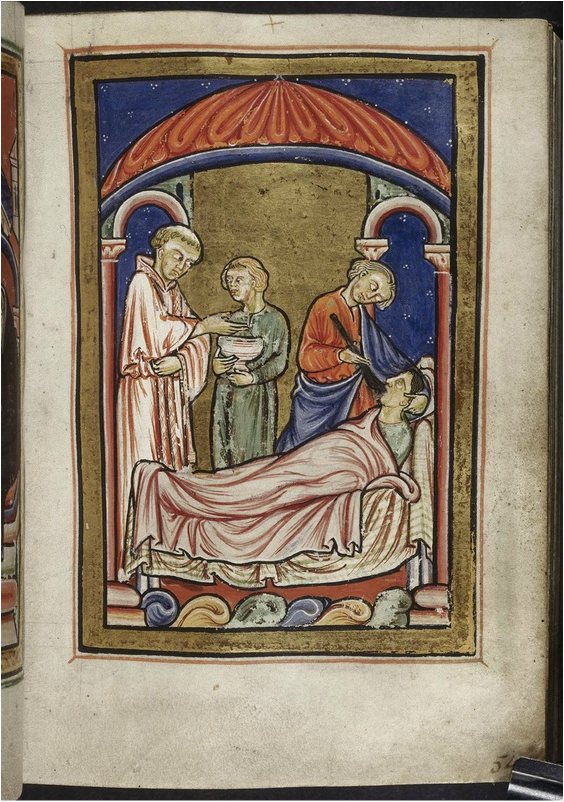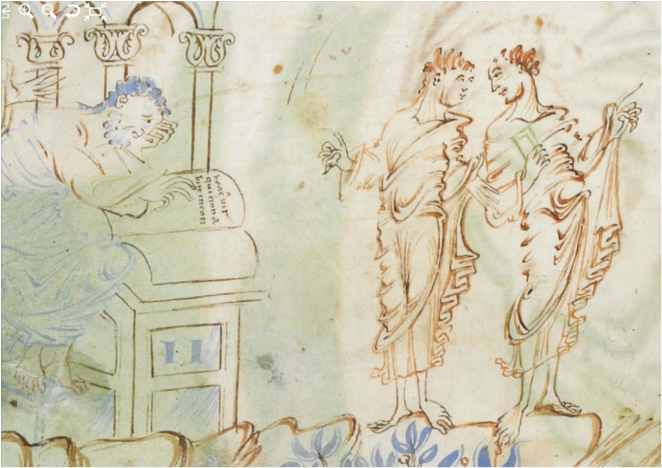|
The Anglo-Saxon Monk looks to the law of Ethelbert for some Easter reflection... and comes up with mutilation, adultery and hair-cutting. Blessed readers, The most important Christian festival approaches: a time for reflection and, for all Anglo-Saxon folk, a time for confession. Now I'm loath to acknowledge it, but my sources tell me that Easter in the twenty-first century is less about the Resurrection of our Lord and more about eating rabbits made of a confection that I only know about because I'm a time traveller. Shame on you! Though I wouldn't mind trying one of those Cadbury's Creme Eggs I've heard about – once my fasting is over, of course. Well now, to the point at hand. I won't say that Bertie's law code contains anything directly related to Easter but there are a number of rulings in there – pretty much all of them in fact – that were you to contravene you would most certainly be obliged to seek out your confessor before Easter Sunday. So in the spirit of Christian love and, frankly, with a dispiriting awareness of your moral frailty, here are my top three crimes for Easter confession. Well, being as I'm advocating honest confession, I should admit that they're actually just the first three random laws that caught my eye. Well, I can't spend all day ruminating over your eternal salvation. I have things to do! Rule 80: If a servant's eye or foot is removed, one should pay to him the entire worth. Now, blessed ones, it is really important that you understand the significance of this law. First of all, I should point out that this is referring to a servant, not a slave. The Old English word I've translated as 'servant' is esne; the word for 'slave' is þeow, which is used elsewhere in Bertie's law. An esne was most likely a poor freeman who hired himself out for labour and consequently came under the control of a master, though was not as lowly as a slave. Originally, the meaning of esne may have been 'harvester', so you twenty-first century folk may want to think of him as a seasonal farm worker. I hear that they work like slaves and get paid very poorly, so the analogy is probably a useful one. Now, should you go and chop off the foot or poke out the eye of someone's servant (accidentally, of course), the Christian thing to do is fess up and pay compensation. Now herein lies the problem: who gets the payment and how much? Well, the poor esne has dropped down the pecking order somewhat, and that's why Bertie's law doesn't specify an exact amount as it does elsewhere for freemen (i.e. 50 shillings for both the removal of a foot and an eye). Rather, you have to pay 'the entire worth', that is, an amount that equates to his entire value as a servant. Only fair, he's not much use any longer now that you've mutilated him, but don't feel obliged to match his value to that of a freeman. After all, rule 80 states that if you bind someone's servant, you pay 6 shillings, which compares rather unfavourably to the 20 shillings compensation for binding a freeman. So with a bit of careful negotiating you can probably knock down your bill to around 15 shillings for a foot and 15 shillings for an eye. Most importantly, if Lisi Oliver, an expert on Anglo-Saxon laws, is right (and I believe she is), then you should make sure you pay this compensation to the master, not the servant himself. My Easter reflection: look after the poor so that they don't have to work like slaves. Rule 31: If a freeman lies with a wife of another freeman, he should recompense with his wergild [‘man-price’] and obtain another wife with his own money and bring her to the other man at his home. [Grammatically, it is possible that ‘her wergild’ is meant.] Inevitably, it has to be said, when it comes to matters of crime and confession, sexual sin rears its ugly head. I can't tell you how regularly we hear within our monastery walls worldly tales of adultery and diverse fornications. At times it seems like we monks talk about nothing else! Well, this law of Bertie's serves to underscore what social upheaval is caused by fellows who can't keep their you-know-what under their tunics. I can tell you that adultery requires at least seven years of fasting, and here in more secular terms we can see how it is an expensive business stealing your fellowman's wife. The wergild, or 'man-price', for a freeman is 100 shillings. So an adulterous man must compensate the innocent husband for the loss of his wife with the same amount of money that would have been paid had he murdered her. So though we sometimes think of wergilds as referring specifically to manslaughter, this law establishes other uses of the concept of 'man-price'. It's quite probable here, as Oliver notes, that it is the value of the wife that is meant. In reality, a free woman's life was valued the same as that of a free man, as we can deduce from rule 73 which states: 'Compensation for a maiden [meaning 'a woman'] is as for a free man'. So whether his or her wergild is meant is a moot point: it's still a hundred shillings you have to fork out! Of course the expense doesn't stop there for you would-be adulterers. You clearly also have the responsibility of finding another wife for the dishonoured man, and that means using your own money to seal a marriage contract for a new bride, paying what in later history is known as the dower. My Easter reflection: you really cannot afford adultery, so stop it! Rule 33: If seizing of the hair [OE feaxfang] occurs, 50 sceattas as recompense. What a fascinating crime to confess: "Father, I pulled someone's hair yesterday". Well, it's not as simple as that. Let's just put this into context. Looking at the Old English word for this crime, feaxfang, we might just get an insight into its nature if we look at the two elements: feax means 'hair' and fang means 'booty'. What I believe is being referred to here in Bertie's law is cutting off someone's hair as a trophy of humiliation. Fifty sceattas (equal to two and half shillings) is fair recompense for such a sin, wouldn't you say, blessed ones? To advance my argument here for the idea of a 'hair-booty' crime, I will fast-forward you to Alfred's law code (written after 893), which has this rather interesting series of laws about the crime of cutting off hair. 35. If anyone binds an innocent ceorl [free man of lowest rank], he is to pay him six shillings compensation. 35.3. If in insult he disfigures him by cutting his hair, he is to pay him 10 shillings compensation. 35.4. If, without binding him, he cuts his hair like a priest’s, he is to pay him 30 shillings compensation. 35.5. If he cuts off his beard, he is to pay 20 shillings compensation. 35.6. If he binds him and then cuts his hair like a priest’s, he is to pay 60 shillings compensation. (From Whitelock, English Historical Documents) I think it's clear that by the time of King Alfred the crime of 'hair-booty' attracted some pretty hefty disapprobation. It's the humiliation, you see. In the case of a man, it's an assault, a disfiguring of his manliness. The only thing about Alfred's law, though, is that it leaves me rather concerned about the way priests and monks were viewed. After all, what's the harm in a bit of forced tonsuring? You don't think Alfred is calling into question the manliness of priests and monks, do you? As if tonsuring a man is three times worse than straightforward follicular emasculation! Oh, he's put me right off my Easter reflections! Works cited: Lisi Oliver, The Beginnings of English Law (University of Toronto Press, 2002), for the esne, see pp. 79, 114, 115; for adultery, see pp. 90, 106; Dorothy Whitelock (ed.), English Historical Documents c.500-1042 (Eyre & Spottiswoode, 1955), The Laws of Alfred, pp. 372-80.
2 Comments
Janilee
27/3/2016 02:33:48 pm
Could the fine be more for cutting the hair like a priest's, because it might get you in trouble with the church?
Reply
Christopher Monk
27/3/2016 02:49:13 pm
I do think there may be a connection to the Church's displeasure over impersonating priests. But I think it's more intriguing when we recognise that this crime is about deeply insulting someone. It was more insulting, and perhaps more deeply shocking, to tonsure a man than to cut off his beard or his hair. I think the symbolism of all these assaults is directly related to emasculating the victim, and so the best or worse way to do that (depending on one's perspective) is to bind him and tonsure him. It's the follicular version of castration! Thanks for the question, Janilee; it's a really fascinating topic.
Reply
Your comment will be posted after it is approved.
Leave a Reply. |
Details
|




